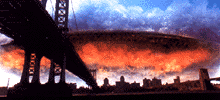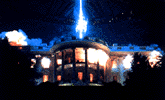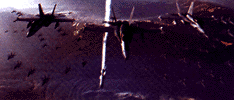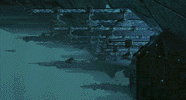Spotlight : July 1996
INDEPENDENCE DAY Explodes In Theatres
The Most Anticipated Film of the Year Has Arrived
By Todd Vaziri
Spotlight : July 1996
INDEPENDENCE DAY Explodes In Theatres
The Most Anticipated Film of the Year Has Arrived
By Todd Vaziri
Hoooohah!
ID4 is the ticket for the summer. It delivers visual thrills, genuine characters, solid laughs, clever plot twists, and over 450 visual effects shots, making it the biggest visual effects film since RETURN OF THE JEDI. Directed by Roland Emmerich and produced by Dean Devlin, INDEPENDENCE DAY revives the disaster genre, essentially untouched since the genre's glory days of the 1970's with such films as THE TOWERING INFERNO and AIRPORT. The film is a guaranteed crowd-pleaser, with stunning sequences and comedy that isn't contrived or forced. My favorite moment of the film could quite possibly be Will Smith kicking the unconscious alien wrapped in his parachute. The laughs were terrific dramatic releases from a very serious situation.
The visual effects can be broken down into a four categories: the 15-mile wide Destroyers approaching, the destruction sequence, air-to-air combat, and inside the mothership.
Emmerich and Devlin will clearly be the new darlings of Hollywood with their new film.
To me, the most incredible accomplishment made by the production team was that the
staggeringly enormous production was made for under $100 million. Most of the credit
goes to Emmerich and Tricia Ashford, the show's visual effects producer, on their
unique approach to the visual effects. If the effects were handled by a single
effects company, such as Digital Domain or ILM, the story would have been much
different. Sure, the shots would have been exceptional, but the effects budget alone
would have mushroomed into tens of millions of dollars, possibly costing the
production over half of its budget.
The work created by the talented visual effects crews of INDEPENDENCE DAY is the
reason why the film is regarded as a modern-day classic.
For more information on INDEPENDENCE DAY, go to the VFX HQ's ID4 page.
 The Destroyers' Approach
The Destroyers' Approach
Nearly all of the Destroyers were physical models digitally composited into background
plates. The surface of the ships is detailed to scale. Composites were sharp, with
only a few exceptions. The shadows that appear over Washington D.C. and New York were
very believable and accurate.
 The Destruction
The Destruction
Only about 30 minutes into the film, we see Washington D.C., New York and Los Angeles
obliterated in a firestorm of hell, generated by a huge energy burst from each
hovering Destroyer [thank goodness I'm here in Chicago :) ]. Although many of the
holocaust shots were revealed on television through commercials and trailers, the
sequence is extraordinary and holds many surprises. The eerie green glow of the
Destroyer's main reactor sets the tone for the historic sequence. Los Angeles is the
first to be hit, with the dramatic demolition of a skyscraper, followed by a huge
firestorm. The miniature pyrotechnics were supervised by Joe Viskocil, the industry
leader in miniature pyro, and his talents shine through in the film. Remember the
incredible nuclear holocaust scene created for T2, realized by 4-Ward Productions?
ID4 blows it out of the water. Especially fantastic scenes include the L.A. tunnel
sequence (with great reflections off of the side of the tunnel), the White House and
Capitol buildings' destruction (which was met by applause in my theatre), and the
opening shot of July 3, with the Statue of Liberty lying in ruin on the ground.
 Air-To-Air Combat
Air-To-Air Combat
The first air-to-air sequence takes place as Will Smith and his fighter pilots attempt
an attack on the Destroyer hovering over Los Angeles. This is where the humans learn
about the alien shields, revealed by a beautiful blue shimmer across its hull. Some
composites contained over 70 elements, from CG fighters, alien attack ships, enemy
pulse fire, missiles and missile trails, and explosions. Each sequence was developed,
produced and composited with constant consideration of screen direction, editing, the
narrative and plausibility. The dogfights are an absolute joy to watch, reminiscient
of the final attack of the Death Star in RETURN OF THE JEDI. Motion blur, camera
shake and other techniques were not overused, like many shows as of late, but were
used to create the illusion of realistic movement.
 Inside the Mothership
Inside the Mothership
Smith and Jeff Goldblum, in one of the film's clever plot points, use the captured
alien vessel from the Roswell landing to enter the Mothership. The flight inside the
belly of the huge craft was edited with the same expertise that made similar
other-worldly sequences in CLOSE ENCOUNTERS OF THE THIRD KIND and THE ABYSS work so
successfully. The design of the interior is rich with blues and greens--depth and
scale are represented well in this sequence. The final destruction of the mothership
was executed in a classic style. Much like the Death Star's destruction in JEDI, and
the Nostromo's destruction in ALIEN, the alien ship explodes as the heroes zoom by the
camera in their alien craft. The bright blue explosion is absolutely beautiful in
full Panavision widescreen. The shot goes on for many seconds, allowing the audience
to enjoy the climax of the film and fully examine the shot.
Back to the Spotlight Main
Menu

. . VFX HQ Produced by Todd Vaziri . . http://www.vfxhq.com . . e-mail: tvaziri@gmail.com . .
All text Copyright © 1998 Todd Vaziri, unless otherwise noted